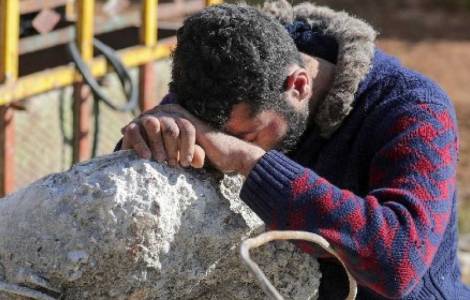
Iskenderun (Agenzia Fides) - In the face of the earthquake that has annihilated thousands of human lives and reduced entire neighborhoods between Syria and Turkey to rubble, the collective tragedy and common pain of different nations and peoples "makes it even more evident, if it weren't already quite clear, that only by moving together in the same direction can we do something useful. A tragedy like this, if it were looked at with lucidity and realism, could become a paradoxical incentive for peace". With this vision and judgment, Bishop Paolo Bizzeti, Apostolic Vicar of Anatolia, analyzes the possible repercussions of the earthquake in the context of tensions, violence, armed incursions, sectarianism and geopolitical voracity which are located precisely in the areas affected by the last catastrophe in the Middle East.
Now the whole world can see buildings crumbling, the frantic attempts to rescue the survivors, the fears of new tremors and the spread of epidemics. But these same areas have for years seen the confrontation and clash with the reivindications of the power of Damascus, the enduring fires of resistance of opposing groups and Islamist militia, the projects of Kurdish autonomy and the incursions and Turkish military occupations in an anti-Kurdish perspective. Meanwhile, Turkish leader Recep Tayyip Erdogan, who has been committed to expanding the scenarios of his geopolitical protagonism for years, aims to perpetuate his power by obtaining another mandate as President in the elections on May 14th.
In this complicated panorama full of unknowns - Bishop Bizzeti points out - "the people affected by the earthquake now only needs help, wherever it comes from. The tragic circumstance we are experiencing, if we look well at things as they are, should be an opportunity for us all to recognize that it is better to tear down walls and fences, political divisions that basically do not do well for the population.
The earthquake is also an opportunity to rethink our lives together, our policies, orienting them towards peace".
Meanwhile, the situation on the ground - reports the Apostolic Vicar of Anatolia - "appears dramatic, especially in urban centers such as Iskenderun and Antakya, where buildings and entire inhabited areas built without criteria have collapsed. The situation is less serious in rural areas, where houses are low. The charity networks linked in various ways to the Catholic Church - starting with Caritas - have all been activated to help the affected populations, and there is close collaboration with state bodies. But the affected area is very vast, and it was not possible to intervene promptly on all fronts". (GV) (Agenzia Fides, 9/2/2023)
 ASIA/LEBANON - General Abagnara (UNIFIL): “The Pope’s visit confirms us in our peacekeeping mission”
ASIA/LEBANON - General Abagnara (UNIFIL): “The Pope’s visit confirms us in our peacekeeping mission”
 ASIA/CHINA - Catholic communities visit the families of priests and nuns ahead of the Lunar New Year
ASIA/CHINA - Catholic communities visit the families of priests and nuns ahead of the Lunar New Year
 ASIA/SYRIA - An office opened in Raqqa to "protect" the properties of Christians in north-east Syria
ASIA/SYRIA - An office opened in Raqqa to "protect" the properties of Christians in north-east Syria